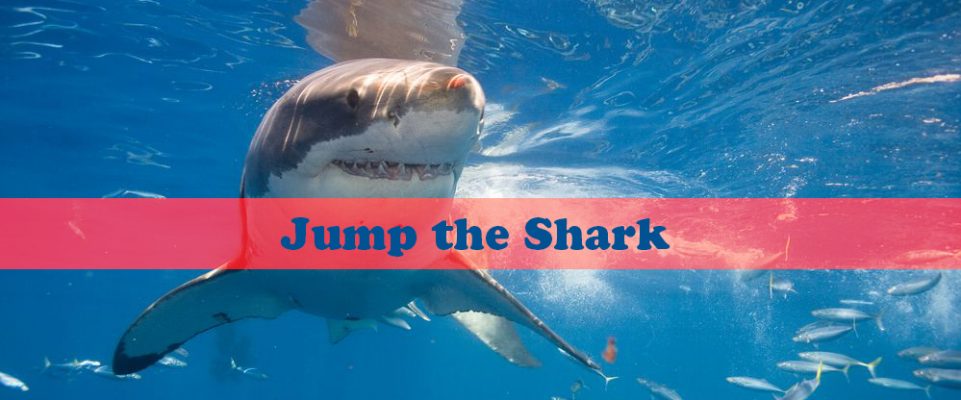Jumping the Shark is a term that’s become both pertinent, and has been over-used this year — but what exactly does it mean?
Jumping the shark is idiom used to describe the moment when something that was popular, crosses a line and, as a consequence, begins it’s trajectory into obscurity!

The phrase originates from the popular TV show Happy Days (1974–1984). Specifically, a scene in which the main character, Fonzie, jumps over a shark while on water-skis. This outlandish storyline was absurdly out-of-place within the original theme of the show, which centred on a group of teenagers, their lives and their desire to be cool (like The Fonz!)
The term is critical, most commonly used in reference to unsuccessful attempts at raising a profile, or promoting something. It is similar in meaning to “past its peak”. But more specifically, it suggests an act of desperation, wherein something or someone is trying to hang-on to relevance or popularity.
When a TV show “jumps the shark” this usually indicates the writers have exhausted their story. That the show has lost its charm, relevance, or that it is, in general, decreasing in quality.
Jon Hein and Sean Connolly coined phrase in 1985, when they were talking about favourite television shows that had gone downhill. The two began identifying other shows in which a similar “jump the shark” moment had occurred. Hein described the term as:
“A defining moment when you know from now on … it’s all downhill … it will never be the same”.
The Jump into Popular Culture
Over time, the idiom crossed over into popular culture, and has since been used in other contexts. Some examples include:
The Mini Countryman
In a review titled “What Part of ‘Mini’ Did You Not Grasp, BMW?”, automotive journalist, Dan Neil, used the expression to condemn BMW for abandoning the company’s design ethos. Neil said that, “with the Countryman, tiny sharks have been jumped”.
Cadillac Cimarron
An automotive blog, The Truth About Cars, used the expression to describe the Cadillac Cimarron, a rebadged luxury car, that ended up being a commercial failure, which did major damage to the brand’s image;
“Yes, as if there was ever any doubt, GM truly jumped the shark with the Cimarron, and it led the way for what was GM’s most disastrous decade ever, the eighties. Only GM could have such utterly outsized hubris to think it could get away with dressing up a Cavalier and pawning it off as a BMW-fighter, without even touching the engine, among other sins.
Michele Bachmann
In September 2011, after Republican presidential candidate Michele Bachmann repeated an anecdote which claimed that the HPV vaccine causes “intellectual disability”. In response, radio commentator Rush Limbaugh said,
“Michele Bachmann, she might have blown it today. Well, not blown it — she might have jumped the shark today.”
Related idioms
Nuke the fridge
Deriving from a scene in the fourth Indiana Jones film, Indiana Jones and the Kingdom of the Crystal Skull, in which Indiana Jones survives an atomic bomb detonation by squeezing himself into a lead-lined refrigerator. The explosion annihilates its surroundings but throws the refrigerator some distance, allowing the protagonist to escape unhurt. Many critics complained that the scene was scientifically implausible.
In 2008, TIME magazine defined nuking the fridge as: “to exhaust a Hollywood franchise with disappointing sequels”. Within two days of the film’s premiere, the phrase “nuke the fridge” had gone viral.
Marrying Irving
Marrying Irving refers to the comic strip Cathy by Cathy Guisewite. On Valentine’s Day 2004, Irving, Cathy’s long-time love-interest proposed marriage. They married almost a year later on February 5, 2005; the strip, which had been in print since 1976, ended October 3, 2010.
In this case, the term indicates a moment when a writer betrays the central premise of a storyline. In this case, Cathy had centred on the protagonist’s experiences as a single, early-middle-aged woman. And fans expected this! Marrying Irving altered the storyline so drastically that original fans deserted.
Marrying Irving moments may be seen as desperate attempts to retain readers by delivering an exceptional event. They can also be seen as “it’s about time” events — where something, long awaited, is finally allowed to occur.
Another example of this is Moonlighting, the popular 80s series, which did not survive after the two single protagonists, with great sexual chemistry, finally became a couple!
Growing the beard
“Growing the beard” is actually the opposite of jumping the shark. It refers to a gimmick or event that dramatically improves the quality. The term derives from the Star Trek: The Next Generation character William Riker, who was clean-shaven for the first season but grew a beard before the second — his new look, it seems, gave the character more credibility and as such, the improved show.
Is 2020 Jumping the Shark?
Well, let’s consider: Coronavirus, has caused a global pandemic. As well as killing many, we also have an economic downturn to look forward to.
In Russia, opponents of Putin have been assassinated using toxins and possibly, nerve agents. There’s currently a popular uprising happening in Belarus (following, what appears to be a rigged election).
In the USA, there’s Donald Trump (in general). Black Lives Matter demonstrations have erupted across the USA, after (another) unarmed black man was killed by police. We’ve seen demonstrations escalate into riots, leading to hugely inappropriate responses from authorities. Many US cities are on fire. The approaching Presidential Election has many reasons to make us nervous.


The Olympics have been cancelled for only the fourth time in modern history. The previous cancellations have been due to war: in 1916, 1940 and 1944. Even Munich’s Octoberfest has been cancelled… for the first time ever!
The rise of Nationalism in multiple countries, the increasing absurdity of Brexit… Yes, it does seem like 2020 has jumped the shark. Let us hope that 2021 is far less “interesting”.

